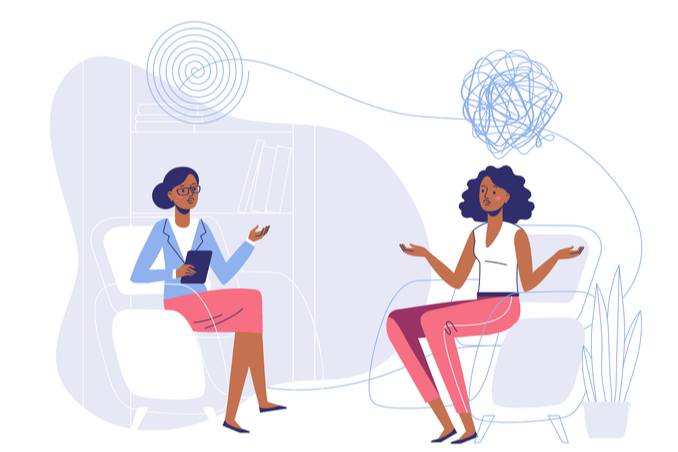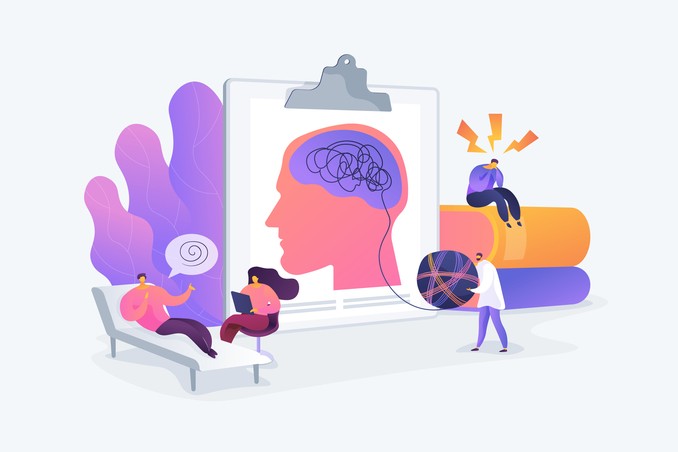Mental health professionals, such as psychiatrists and therapists, are experts in how the mind works. When your mind is unwell it can affect your well-being, but also your behaviors. When it comes to mental health there are a few different types of professionals who can help, which is wjy it makes sense to better understand the differences between psychologists and psychiatrists.
It is not to say what is better: a psychologist or psychiatrist, but instead, to understand when each professional is most helpful or appropriate. The difference between psychologist and psychiatrist can be better understood by defining both professions, how they treat and operate overall.
Psychologist vs Psychiatrist
Table of Contents
When it comes to the differences between psychologists and psychiatrists, there are a few main things to look out for. Psychiatrists are specialists who prevent, diagnose and treat mental disorders. Psychologists are medical doctors, and they complete four years of medical school and an internship for one year. Psychiatrists are also doctors and are required to go to medical school.
Because both professions require extensive education and training, these professionals can both differentiate underlying medical conditions from mental illnesses. Both professionals monitor how mental problems affect people’s physical conditions, and how mental problems go along with physical conditions.
The differences between psychologists and psychiatrists lies primarily in licensing to prescribe medications in relation to treating anxiety, depression, and other mental conditions. Psychiatrists specifically prescribe medications. When medications aren’t enough, a psychiatrist may refer their clients to therapists such as psychologists, psychotherapists, social workers, and marriage counselors.
What is a Psychiatrist?
There are three main areas in which psychiatry and psychology differentiate. These three areas are treatment, education, and practice. Each has similar aspects when it comes to psychiatry and psychology, but they are also different.
Treatment
Psychiatrists are trained, medical doctors. They can prescribe medications, and often spend a lot of time working on patient medication management. They design treatment plans and focus on treating mental disorders with the use of medication.
Education
Another of the differences between psychologists and psychiatrists comes from level of education. Both psychiatrists and psychologists often attend medical school and are trained in general medicine, but psychologists are not always required to.
Psychiatrists, after earning an MD, must go into four years of residency training. This is done specifically in psychiatry, and their experience usually involves working in the psychiatric unit of a hospital. This training provides the opportunity to work with various patients. Whether those are children or adolescents, or individuals with behavior disorders, as well as adults with cases of mental illness.
Practice
It is common that patients will first go to a primary physician for a referral. After this, the patient might work regularly with a psychologist. This will allow them to understand their behavioral patterns, and use medication when necessary.
What is a Psychologist?
Treatment
When you think about what is the job of a psychologist, it is important to note that it is more about emotional and mental health rather than medication. Psychologists focus mainly on psychotherapy and treating suffering.
When this comes to treatment, behavioral intervention is commonly used. Psychologists are also able to conduct psychological testing. This helps to assess your mental state and to determine the best course of action in terms of treatment. Overall it is essential to have this form of assessment otherwise you may be misdiagnosed.
Education
Psychologists must obtain a Ph.D. or PsyD doctoral degree. This can take up to four or six years. Through this education, there are a few main focuses of study. These include:
- Personality development
- History of psychological problems
- Science of psychological research
During graduate school, psychologists will learn how to diagnose mental and emotional disorders, After this schooling, there is a required internship that can last anywhere from one to two years. This exposure can offer insight into:
- Different methods of treatment
- How to pursue testing
- Problem-solving techniques
- Methods of psychological theory
- Options for behavioral therapy
After the internship has been completed there will be a required period of work experience. This is done under the supervision of a licensed mental health professional.
Practice
It is common that psychologists often refer their patients to psychiatrists. In this case, the psychiatrist will prescribe and monitor medication. Then these two professionals are able to work together to treat symptoms from behavioral and clinical standpoints.
What is a Therapist?
Adding a further wrinkle to the differences between psychologists and psychiatrists, comes the profession of therapist. In general, therapists are similar to that of a psychologist, but they are not doctors. Therapists must have at least a master’s degree, and they can typically diagnose and treat mental conditions. Despite this, it is important to note that therapists are not doctors and can not prescribe medications. The main purpose of a therapist is to help people understand their feelings and thoughts. Then the next stage is to make changes to improve themselves and develop life skills.
Types of Therapists
- Psychologists: Have a doctorate degree. This is always in psychology and must be obtained by going to graduate school. Here they will be able to treat emotional and mental illnesses.
- Licensed mental health counselors: With a master’s degree in psychology or a counseling-related field, these counselors must complete licensing and training. Typically the license is obtained with two years of training. The purpose of a licensed mental health counselor is to treat mental illnesses with therapy.
- Clinical social workers: Different than the above two, social workers have a master’s degree in social work. They may be given more training to evaluate and treat mental disorders. Most often a social worker functions as an advocate for their patients.
Types of Counseling Available
Individual Therapy
Individual counseling is a one-on-one session that involves sitting down with a therapist or psychologist. This is a private meeting and requires complete confidentiality for the patient. Whether these sessions are short-term or long-term, they can also be used in conjunction with medication from a psychiatrist. Overall, the psychologist, therapist, or counselor should help you to learn tools and skills to fix your problems. You might also set goals and obtain guidance on how to handle situations.
Benefits from individual therapy include:
- Developing communication skills: Most people can benefit from strengthening communication skills. Despite this, individual therapy is sometimes helpful to learn how to identify these skills.
- Develop problem-solving skills: By going to individual therapy you can learn problem-solving skills. You should work with your therapist to understand your problems, and then you can determine how to solve these problems. Then you will know how to use these skills to solve problems on your own.
- Mental health management: Stress, anxiety, and depression can compound and hurt anyone. Even if you are not sure that these issues impact you, it is helpful to work with someone that can give you some guidance in these areas.
Group Counseling
By going to group counseling sessions you can interact with other people who struggle with the same issues as yourself. Oftentimes these groups will include a number of clients along with one or two psychologists, therapists, or counselors. Discussions will often take place with a psychologist or counselor facilitating the conversation. Benefits of group therapy include:
- Understanding you are not alone in your struggles
- The realization that everyone is struggling with some type of mental health issue
- Push away feelings of shame or embarrassment
- Allow you to feel accepted and comfortable
- Gaining perspective
- Finding new ways to understand your situation through the experiences of others
Family Therapy
Family therapy offers the chance to discuss things with a psychologist present. Especially if there has been a life-changing event within the family, this can mean that family therapy will be extremely helpful. Family counseling can help your family move past the event together.
Despite this, there does not need to be one single event that is the catalyst for your family to need counseling. Life can be stressful and cause it to be difficult to have good communication between members. When fights occur, the best way to fix this tension is to go to therapy with a psychologist. Reasons to go to family therapy:
- Medical problem in one family member
- Conflict between two or more family members
- Behavioral problems with one family member
- Life changes, might include a new marriage or moving out of the family home
- Loss of a job or other financial struggles
Through these sessions, members of the family will learn how to be better communicators. Through problem solving and communication you can then learn how to effectively move forward. Family counseling also allows you to air your grievances respectfully. You can learn to do so kindly which helps to prevent hurt feelings and promotes understanding.
Teen Counseling
It can be difficult to always do the right thing for your child. If you are unsure if your child can benefit from teen or child counseling, they most likely will. Parents or loved ones might assume that odd behavior is a change in hormones or other childhood normalcy. Despite this, if your child seems different, teen counseling might be the best choice to help. Signs to look out for that your child may need teen counseling includes:
- Feelings of hopelessness
- Lack of confidence
- Changes in sleep or eating patterns
- Sudden weight gain or loss
- Being in a constant state of worry, similar to anxiety
Reasons your child might need teen counseling include:
- School stress
- Overall stress
- Depression or anxiety
- Family issues
- Grief
- Trauma
- Poor self-esteem
Dialectical Behavior Therapy
Known as DBT, Dialectical Behavior Therapy is a specific form of group therapy. It teaches proven skills that help people learn how to handle overwhelming emotions. It can also help you to learn how to handle recurring thoughts or worries. Overall, it is a method of treating mental health conditions. Sometimes it can also teach patients how to handle difficulties maintaining boundaries in their relationships.
DBT groups are very common and can make life easier by teaching skills that help you to make difficult decisions in your life. There are four sections of DBT. These include:
- Mindfulness: Known as the main part of DBT, this skill is one of the most important. These skills help you learn to stop placing judgments on thoughts and feelings. It is also all about learning to stay in the moment and not living in the past. At this point, you will learn to make good decisions and avoid doing so based on emotion.
- Emotional regulation: In this module, you will learn skills designed to feel more in control. It should also help you to better understand your emotions. You should also learn to hold your feelings until you get to a point that you cannot, and begin unhealthy behaviors.
- Interpersonal effectiveness: In this module, you will examine relationships. This part of the treatment teaches you how to maintain boundaries. You need to learn to ask for what you want, but also be assertive when you aren’t comfortable with something. It is ok to turn down a request that might be unreasonable or unhealthy.
- Distress tolerance: This module is the final section, and it teaches you “radical acceptance.” Along with the primary module of mindfulness, this is known as one of the most important DBT skills. If you cannot accept your current circumstances, then you will never understand your own emotions and limitations. Without all of this, change is impossible. During this period you will also learn how to plan for events in the future so that they do not come back to haunt you and hurt you in the future.
Looking for Help With Your Mental Health?
We hope these differences between psychologists and psychiatrists have helped if you are trying to decide whether or not you should work with either of these medical professionals or with a therapist as well. The main difference is that one can prescribe medication and the other focuses on emotional well-being. Ask yourself whether you need talk therapy or something more serious that requires medication. This can allow you to talk to the right professional to get the help that you need.
Contact us today at Find Addiction Rehabs to learn more about which is right for you. It is never too late to start treatment.
Brandon is a highly skilled content writer and behavioral health marketer with over a decade of experience. In his own words: in my work with Find Addiction Rehabs, I have dedicated my expertise to a cause close to my heart – substance abuse recovery. Through my passion for the field, I’ve successfully compiled a track record of crafting compelling content that educates, inspires, and supports those on their recovery journeys.





